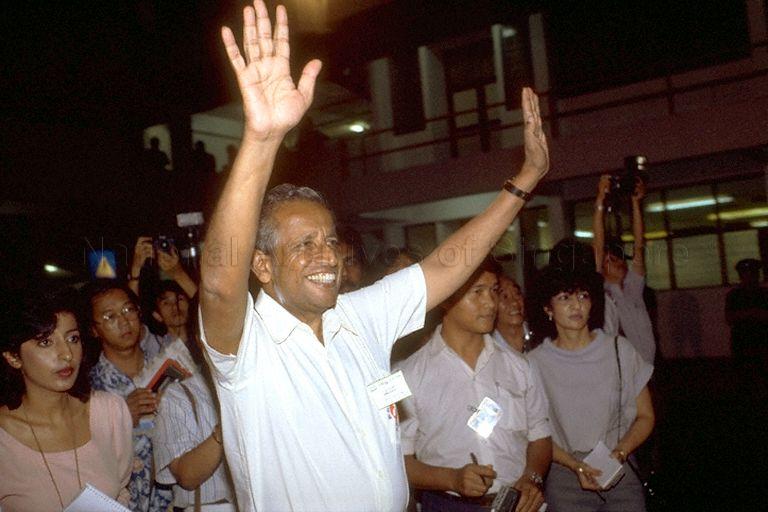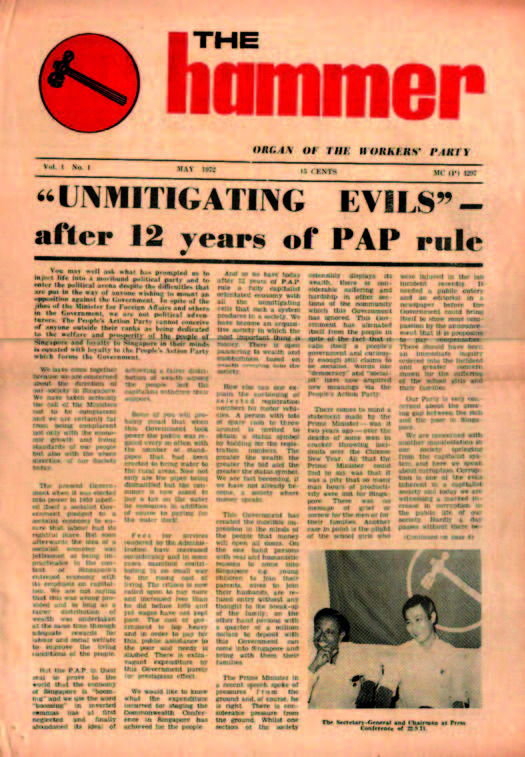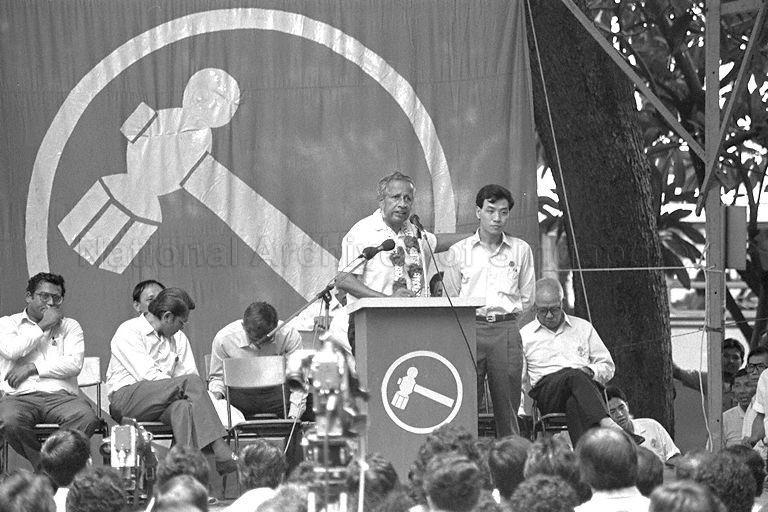
Voice of Democracy (1971 – 1988)

Source: Ministry of Information and the Arts Collection, courtesy of National Archives of Singapore
After Marshall’s exit, The Workers’ Party went into a period of dormancy, and was sustained only by a handful of individuals. In 1971, lawyer and former district judge Joshua Benjamin Jeyaretnam led a team of professionals and businessmen to revive the party. The Workers’ Party’s participation in subsequent elections became more robust, cumulating into Jeyaretnam’s victory in the Anson by-election in 1981. This ended the People’s Action Party’s monopoly over Parliament, and the 80s saw to heightened political activity in Singapore.
Several changes were introduced to Singapore’s electoral system during this period, such as the Group Representative Constituency, the Non-Constituency Member of Parliament, and the Nominated Member of Parliament. The People’s Action Party also faced heavy criticisms during this period, as it attempted to introduce a few unpopular policies, such as the Graduate Mothers’ Scheme.
1972: Hammer

The inaugural issue of the party’s newsletter, Hammer, was released. The publication was intended to counter-balance the mainstream media while also being a platform for WP’s outreach.
2 September 1972:
General Election
Rejuvenated by JBJ’s leadership, WP gains some momentum, and gains 24.5% of the valid votes for its 26 candidates, the greatest opposition showing since independence.
29 March 1973:
Splinter group forms United Front
A group of WP members leaves the party to form their own – United Front. They are led by Ng Ho and Seow Kee Leng.
23 December 1976:
General Election
WP fields 22 candidates at the elections, and increase its vote share slightly to 27.9%.
20 November 1978:
Defamation suit against JBJ
Prime Minister Lee Kuan Yew takes JBJ to court for defamation. JBJ allegedly defamed Lee during an election rally on 18 December 1976.
23 December 1980:
General Election
Despite fielding much lesser candidates than the previous election, WP manages to increase its vote share. With only 8 candidates, they secured 29.2% of the valid votes.
31 October 1981:
The big break: Anson By-election
Following Devan Nair’s appointment as President of Singapore, the electoral seat for Anson was vacated on 23 October 1981, prompting yet another by-election. After a three-corner fight between WP’s JBJ, PAP’s Pang Kim Hin and United People’s Front’s Harbans Singh, WP wins the seat with 51.9% of the valid votes. WP’s victory marks a significant milestone for opposition parties in Singapore, ending PAP’s 15-year-long monopoly over Parliament.
May 1982:
MP’s office set up
After HDB disallowed JBJ from using the office that was previously used by PAP MP, constituents and supporters helped to set up JBJ’s office within the ward at Blk 145 Jalan Bukit Merah.
24 July 1984:
Non-Constituency Members of Parliament (NCMP) Scheme
Not long after the end of PAP monopoly on Parliament, the government begun to introduce several revisions to Singapore’s legislation. The first of these was the NCMP scheme, which specified that should the opposition fail to secure a Parliamentary seat, the three best performing opposition candidates would be able to seat in Parliament. The scheme was intended to improve the quality of parliamentary debates and guarantee an ‘opposition voice’ in Parliament.
22 December 1984:
General Election

Source: Ministry of Information and the Arts Collection, courtesy of National Archives of Singapore
Yet another landmark election in Singapore’s electoral history, WP manages to retain its seat in Anson, while the Singapore Democratic Party’s Chiam See Tong wins another in Potong Pasir. PAP’s vote share also dips by more than 10%. Many suggest that this was due to the ‘Graduate Mothers Scheme’ that PAP attempted to introduce in the year prior, which pushed for policies favouring the children of graduate women.
November 1986:
JBJ disqualified
JBJ and WP Chairman, Wong Hong Toy, were each fined $5000 and sentenced to one month’s imprisonment for making false declaration of WP’s accounts. Due to this, JBJ is disqualified and WP loses its only seat in parliament.
21 May 1987:
Marxist Conspiracy
22 young activists were arrested by the Internal Security Department on allegations that they were linked to a Marxist network aimed at subverting the state through communist united front tactics. Among those arrested, some were volunteers of WP. WP spoke out against the arrest, arguing that ‘detention of persons without trial is an abrogation of the rue of law and can only be justified where the whole fabric of society is threatened’. JBJ also refuted any claims that the party has allowed itself to be utilised for subversive purposes.
4 November 1987:
Party split
Chairman of WP, Wong Hong Toy, quit the party after failing to admit three members into the Central Executive Council (CEC). Wong accused JBJ of being resistant to rejuvenate the party leadership, which JBJ refuted with evidence that the CEC included several professionals, including Low Thia Khiang. Wong’s exit saw close to 20 members leaving with him, all of them joining the Singapore Democratic Party.
May 1988:
Merger with Barisan Sosialis
Barisan Sosialis, the left-wing breakaway group of PAP, led by Lee Siew Choh, joined WP.
18 May 1988:
Group Representation Constituency
Group Representation Constituency (GRC) was introduced into Singapore’s constitution. Its main objective was to ensure minority representation in Parliament. However, the GRC system was met with many criticisms. WP has been against it since it was first brought up in Parliament.
19 August 1988:
Merger with Singapore United Front
Seow Khee Leng, leader of the Singapore United Front, joined WP along with seven other members.
3 September 1988:
General Election

Source: Ministry of Information and the Arts Collection, courtesy of National Archives of Singapore
WP ran an intense campaign, fielding 32 candidates, taking 38.5% of the popular vote. Eunos GRC was one of the hotly contested constituencies, seeing a face-off between PAP’s Tay Eng Soon, Chew Heng Ching, and Zulkifli bin Mohamed, and WP’s Francis Seow, Lee Siew Choh and Mohd Khalit bin Mohd Baboo. Francis Seow, former Solicitor-General and Law Society President was the party’s star candidate, but also faced heavy criticism by PAP, especially for his association with the Marxist Conspiracy. The 3-man team narrowly lost with 49.1% of the votes.
Lee Siew Choh and Francis Seow were offered the Non-Constituency MP seats. However, Francis Seow was disqualified due to tax evasion charges. Lee Siew Choh became the first NCMP, marking 25 years since his last stint with PAP and Barisan.

